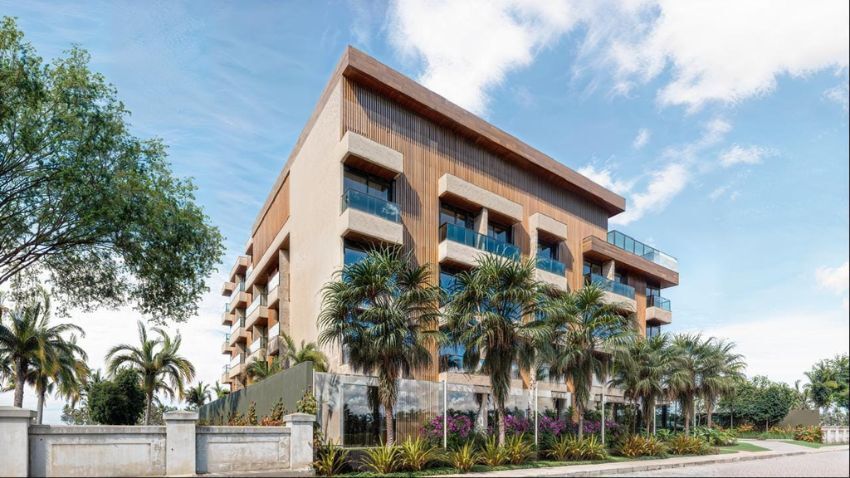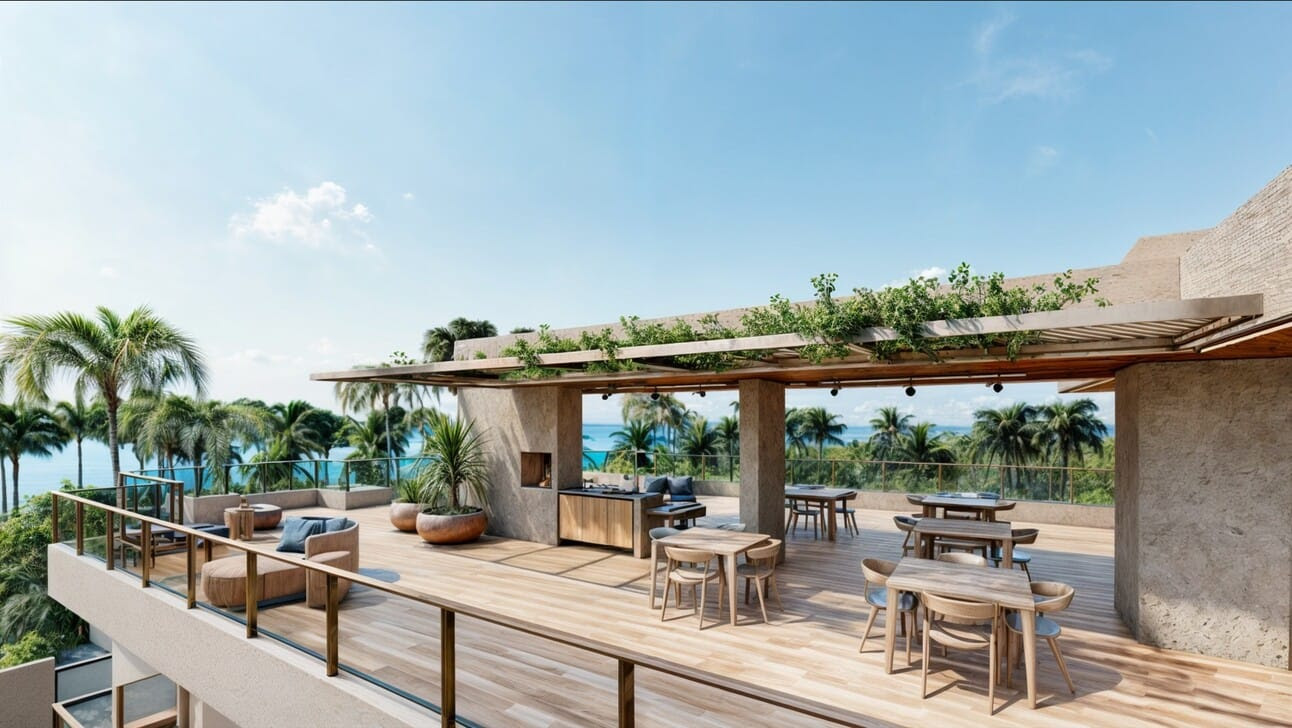Why I Own Real Estate in Multiple Countries...
Over the years, I’ve built a portfolio of real estate across numerous countries - not just as investments but as strategic tools to ensure freedom,...
7 min read
 Team Brazil Beachfront
:
August 6, 2024
Team Brazil Beachfront
:
August 6, 2024

Maneuvering through the complexities of foreign ownership laws in Brazil can be an intimidating task for you if you're eyeing the property market there. These laws, particularly stringent in rural and border areas, not only dictate who can buy and how transactions are conducted but also what potential penalties you might face for non-compliance. As you explore these intricate legal frameworks, you'll need to stay abreast of the latest reforms that could either tighten or relax these regulations. With potential changes on the horizon, one must wonder: what opportunities or pitfalls might emerge for foreign property investors like yourself in the near future?

Historically, Brazil has imposed strict regulations on foreign ownership of property, especially in rural and border areas, to safeguard national interests. If you're a foreign investor eyeing rural property in Brazil, you've likely encountered these restrictions.
Initially, Brazil's Constitution actively limited foreign ownership to maintain control over strategic areas. However, since 1995, constitutional amendments began to dismantle some barriers, reducing the distinctions between foreign and local capital. Yet, the ownership of rural land remained tightly controlled.
You must register your investment with the Central Bank of Brazil within 30 days to comply with existing regulatory frameworks. This step is vital as it aligns with Brazil's efforts to monitor and control foreign investment in sensitive sectors.
Over the years, the Brazilian government has initiated liberalization in various sectors, like airlines, signaling a shift towards more openness. Discussions are ongoing to further ease restrictions on rural property for foreign investors, reflecting Brazil's growing interest in attracting more foreign investment.
These potential reforms represent a significant departure from the past, moving towards a more liberal investment environment. So, keeping abreast of these changes is important for steering through the investment landscape effectively.
As of now, foreign investors face specific restrictions when owning rural properties in Brazil, requiring special approvals particularly in border zones. Under the Brazilian Constitution, you're limited in how much land you can own in these areas, creating a need for a local nexus to facilitate such acquisitions. This has significant implications for your property investment strategies.
You must also adhere to rules when investing in rural properties, necessitating registration of your investments with the Central Bank of Brazil within 30 days of acquisition. This requirement guarantees compliance with local regulations and facilitates smoother transactions.
Recent legislative discussions have been focused on easing these restrictions, potentially enlarging the investment opportunities available to you in rural Brazil. Such changes could make it easier for you to engage more deeply in the Brazilian market without the current cumbersome processes.
It's essential to keep an eye on these developments, as they can directly impact your investment portfolio and strategic planning in Brazil. Understanding these ongoing legislative changes will assist you in making informed decisions and leveraging potential new opportunities in the Brazilian property market.

You'll find that foreign ownership in Brazil isn't only limited in rural areas but also in key sectors like media and broadcasting, where you can hold no more than 30% ownership. This cap directly impacts your potential investment in media companies, restricting the influence you might otherwise seek in this influential sector.
Moreover, the acquisition of agricultural land by foreigners faces stringent scrutiny, especially if the properties are situated in border zones. These investment restrictions are designed to safeguard national security and preserve territorial integrity. If you're eyeing agricultural investments, be prepared for a thorough review process by regulatory authorities.
In the domains of telecommunications and financial services, the barriers are similarly high. Any significant foreign ownership in these sectors requires explicit approval from bodies like the Central Bank of Brazil. This guarantees that strategic communications and financial networks remain under national supervision to some extent.
Additionally, in sectors where the Brazilian government has retained a golden share in privatized companies, your investment options might be further restricted. This golden share empowers the government to block changes in ownership that could transfer substantial control to foreign entities, particularly in sensitive areas like defense.
Steering Brazil's legal framework requires foreign investors to register their investments with the Central Bank of Brazil within 30 days, guaranteeing compliance through precise documentation. You'll need to provide detailed supporting documentation to comply with the RDE-IED system. This system is key in managing foreign ownership and investment restrictions, helping you navigate through Brazil's property investment landscape.
Your journey doesn't end with registration. Working with a local proxy attorney becomes essential, especially for managing legal notifications and guaranteeing ongoing compliance with local laws. This attorney will be your lifeline, handling the complex bureaucracy that could otherwise be overwhelming.
Documentation is a vital part of your investment process. Here's a quick guide on what you need to prepare:
| Document Type | Purpose | Required By |
| Investment Registration | Formalizes investment with Central Bank | 30 days post-investment |
| Proxy Representation | Facilitates legal notifications and transactions | Prior to transaction |
| Compliance Documents | Avoids penalties; guarantees adherence to local laws | Ongoing requirement |
| Ownership Limits | Confirms adherence to investment restrictions | At investment & periodically |
| Local Law Adherence | Guarantees compliance with area-specific regulations | Before and during ownership |

Now, let's examine the specific regulations that govern the ownership of rural and border area properties in Brazil.
As a foreign investor, you're faced with significant restrictions when it comes to acquiring rural properties. These limitations are particularly stringent in border areas, where the Brazilian government enforces local nexus requirements to protect national security and local interests.
In these regions, foreign ownership of rural land is capped at 50% in any municipality. This rule places a strict limit on your investment potential, ensuring that the majority of land in these sensitive zones remains under Brazilian control.
Furthermore, any intention you have to acquire such properties requires special approvals, which are scrutinized to align with national security measures.
Recent legislation, however, is under consideration that might ease these constraints. If passed, it could open new opportunities for you to invest in Brazil's rural zones, potentially relaxing some of the current stringent regulations.
But as of now, you must navigate a complex landscape of approvals and restrictions designed to safeguard Brazil's border areas and rural regions against excessive foreign control.
Facing these regulations, you must evaluate the significant impact they've on your ability to invest in Brazil's rural and border areas. As a foreign investor, you're facing a layered landscape of legal treatment and registration requirements that could shape your investment strategies. Under the Brazilian Constitution, while there's a formal equality in treatment between foreign and local investors, specific restrictions in rural properties, especially in zones close to national borders, necessitate careful planning and understanding of the legal framework.
Here are some essential points to evaluate:
These factors directly influence your property investment decisions in Brazil. Understanding these dynamics is vital to navigate the complexities and leverage potential legislative changes that may favor foreign ownership in the future.

How does Brazil's government policy provide incentives for foreign investors?
The Brazilian government is actively revising legislation to ease restrictions on foreign ownership, particularly in rural areas. This shift aims to open more doors for property investment while still safeguarding national interests. By treating foreign investors on par with local ones in many sectors, and promoting equitable opportunities, Brazil creates a welcoming investment climate.
Significantly, Brazil supports numerous public-private partnerships, especially iinfrastructure and renewable energy. These collaborations not only boost the economy but also offer lucrative investment opportunities for you. The government's commitment is further highlighted by tax reforms initiated under President Lula da Silva's administration. These reforms simplify the existing tax code, making it easier for you to invest and reap potential benefits.
Moreover, the Brazilian Trade and Investment Promotion Agency (APEX) plays a vital role in investment promotion. APEX assists you by pinpointing viable business opportunities and easing the navigation through Brazil's investment landscape. This thorough support system guarantees you're well-equipped to capitalize on the business opportunities available, aligning your investment endeavors with the broader economic goals of Brazil.
Brazil's government is actively considering new legislation that could considerably ease restrictions on foreign ownership of rural properties, potentially opening vast opportunities for you in agriculture and land development. This move is part of a broader trend towards liberalization, aimed at enhancing the attractiveness of Brazil for property investment, particularly in the agricultural sector.
The proposed changes signal a significant shift in policy, reflecting the government's commitment to fostering economic growth through foreign investment.
Here's what you might expect:
These developments are part of a series of investment reforms that Brazil is embracing. By focusing on liberalizing the economy and removing outdated restrictions, Brazil aims to position itself as a lucrative destination for foreign investors like you, keen to tap into its vast potential.
Investing in Brazil, you'll face numerous disadvantages, including high transaction costs and complex legal frameworks.
Currency volatility and economic fluctuations can undermine your financial stability, while tax implications and bureaucratic hurdles delay processes.
Market instability, political risks, and infrastructure challenges further complicate investments.
Additionally, title disputes can jeopardize property ownership.
These factors combined make investing in Brazil a challenging endeavor with potential risks to both your time and capital.
Yes, as a foreign company, you can own land in Brazil, but you'll face certain limitations, especially in rural areas.
You must comply with foreign investment regulations and land ownership restrictions.
Registering with the Central Bank is essential for legal compliance.
Understanding these aspects, along with the property acquisition process and taxation implications, is key to steering through the Brazilian property market effectively.
Leasehold agreements and investment incentives may also influence your decisions.
Investing in Brazilian real estate could be beneficial for you, given the promising investment opportunities and favorable market trends.
However, you'll need to take into account the rental yields, property taxes, and financing options.
Understanding the legal requirements is essential, as well as evaluating economic stability and urban development prospects.
Be aware of the challenges expatriates might face.
This thorough approach will help you decide whether investing in Brazil's property market aligns with your financial goals.
When you're considering which country invests the most in Brazil, the United States tops the list. This reflects strong foreign investment trends and underscores the significant economic impact and investor confidence.
Bilateral trade agreements, market entry strategies, and sector-specific opportunities further enhance this dynamic.
However, remain cautious of currency exchange risks and political stability concerns.
Understanding Brazil's investment incentives and foreign ownership regulations is essential to steering these waters effectively.
As you consider investing in Brazil's property market, remember that managing foreign ownership laws is essential.
These regulations, especially in rural and border areas, can greatly impact your investment strategies. Stay informed about sector-specific restrictions and upcoming legislative changes.
By understanding the legal processes and leveraging government incentives, you'll be better positioned to capitalize on potential opportunities.
Keep an eye on future reforms—they might just open new doors for your investments in Brazil.


Brazil Beachfront is your trusted source for uncovering the incredible opportunities along Brazil’s breathtaking Northeastern coastline. With Brazil’s economy on the rise and its middle class growing rapidly, the market offers an undeniable upside for offshore investors.
The newsletter also showcases past projects, providing readers who have purchased real estate with detailed construction updates to keep them informed every step of the way. From the lifestyle appeal of Brazil’s pristine beaches to the financial advantages of investing in this high-growth market, Brazil Beachfront delivers the insights and updates needed to capitalize on one of the world’s most dynamic real estate opportunities.

Over the years, I’ve built a portfolio of real estate across numerous countries - not just as investments but as strategic tools to ensure freedom,...

Every week, I bring you deals, insights, opportunities and off-market projects that nobody else has access to……and many of you assume it’s because I...

If you were to visit Porto das Dunas today, you would feel something that is hard to capture in photos……it feels organized.Traffic flows smoothly....